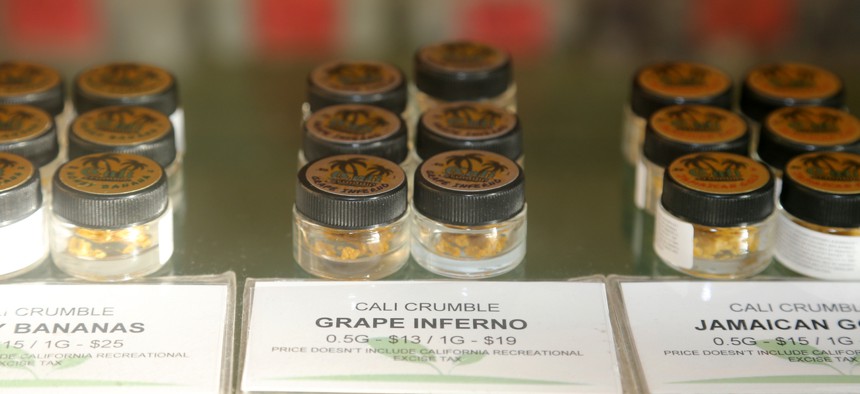
More than 30 states permit the use of marijuana for medical reasons. Above, offerings at a dispensary in California. Shutterstock.com
Past Marijuana Use Is No Longer a Disqualifier for a Federal Job
As more states legalize marijuana, the federal government’s HR agency said agencies can hire people who have used the drug, provided there is “evidence” the candidate will not use it anymore.
The Office of Personnel Management on Thursday told agencies that past use of marijuana should no longer automatically rule out candidates for federal jobs.
In a memo to agency heads, Acting OPM Director Kathleen McGettigan said that although the use and possession of marijuana is a federal crime, a growing number of states have legalized or loosened restrictions on the drug and the federal government has not interfered with those decisions. So far, 15 states and the District of Columbia have either legalized or decriminalized possession of marijuana, while another 33 states permit its use for medicinal purposes.
“As more state laws have changed, federal agencies are increasingly encountering individuals whose knowledge, skills and abilities make them well-qualified for a position, but whose marijuana use may or may not be of concern when considering the suitability or fitness of the individual for the position,” McGettigan wrote.
An individual’s past criminal or history of drug use should always be considered on a case-by-case basis, as well as other factors, including the nature of the job they seek; the circumstances surrounding their drug use; their age at the time; “contributing societal conditions”; and any efforts toward rehabilitation, McGettigan wrote.
“Past marijuana use, including recently discontinued marijuana use, should be viewed differently from ongoing marijuana use,” McGettigan wrote. “The nature and seriousness of the use and the nature of the specific position for which the person is applying are also likely to be important considerations. It is also necessary to assess all possible indicators of rehabilitation, which may include, among other things, evidence that use will not occur again, the passage of time without use, or completion of (or current participation in) treatment or counseling.”
In some cases, a “commitment to not using marijuana going forward” may be enough to qualify an applicant to join a federal agency, she said.
Nonetheless, the federal government’s refusal thus far to override states’ efforts to legalize the use of marijuana does not mean that federal employees may partake in it if they live in one of those jurisdictions.
“Heads of agencies are expected to continue advising their workforce that legislative changes by some states and the District of Columbia do not alter federal law or executive branch policies regarding a drug-free workplace,” McGettigan wrote. “An individual’s disregard of federal law pertaining to marijuana while employed by the federal government remains relevant and may lead to disciplinary action.”







